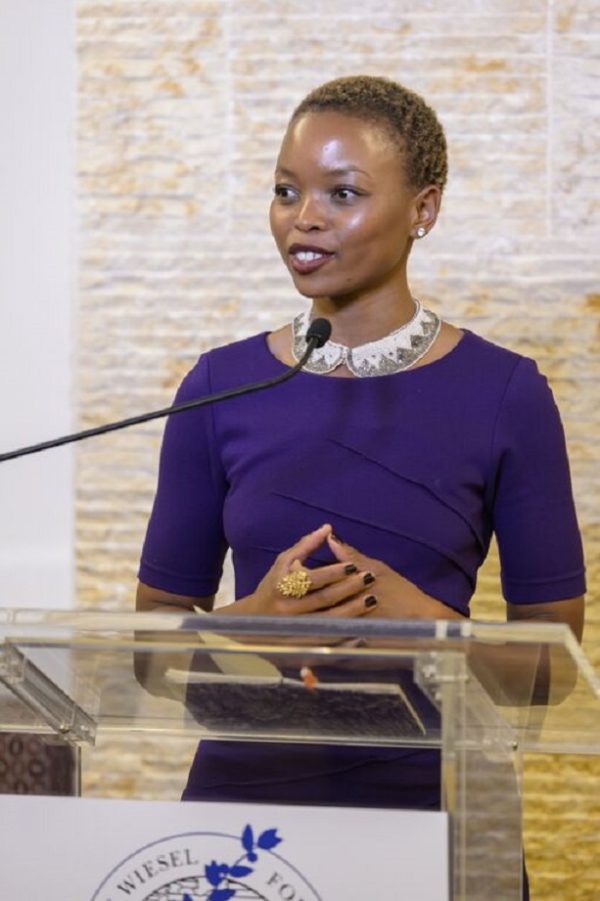
Africa in Dialogue has collected interviews with the five authors shortlisted for the 2017 Caine Prize in an e-book. The interviews were all conducted by the magazine’s editor, Gaamangwe Joy Mogami. We are republishing select interviews from the e-book.
*
South Africa’s Magogodi oaMphela Makhene is shortlisted for “The Virus,” published in The Harvard Review 49 (Houghton Library Harvard University, USA. 2016). Magogodi’s work has appeared in Ploughshares and Elie Wiesel’s An Ethical Compass, and has been recognised by the NYU Reynolds Program for Social Entrepreneurship, the Elie Wiesel Foundation for Humanity and the Truman Capote Fellowship at the Iowa Writers’ Workshop, where she earned her MFA. Magogodi is a recipient of the David Relin Prize for Fiction and is currently working on a collection of interwoven stories exploring the inner lives and loves of ordinary South Africans. This conversation took place via email between Gaamangwe Mogami in a green bedroom in the cold, sweetspot of Gaborone, Botswana and Magogodi between places—on a train from the Hudson Valley to NYC. Here, they discuss South African history, denial, Afrikaans, and why language is primal.
Gaamangwe
So first, congratulations on being shortlisted for the Caine Prize award! How are you feeling about being part of the shortlist for the biggest award in Africa?
Magogodi Makhene
Being nominated for any international Prize is good news for a writer, especially a writer at the beginning of her career. The Caine Prize is especially meaningful to me because it celebrates African writing.
Gaamangwe
It’s so unbelievable that you are still at the beginning of your career, because really your story is on another level. I have not encountered anything like it before! It’s such a detailed story, with an interesting form. I am curious about how it came out of you. What it wanted to say before it was written and when you wrote it?
Magogodi Makhene
Thank you, Gaamangwe! This is a big, important and difficult question to answer. The honest answer is I don’t know. The mystery of where stories come from and why and how they take over a page is an essential part of writing for me. Writing is bleeding out your faith on the page. “The Virus” came as a surprise to me—the character and terrain felt equal parts exhilarating and excruciating. It also surprised me this man lived somewhere in the subconscious of my being. Had he always been there? What did his existence on the page say about my existence in his world? The strange mystery of these questions keep me writing.
Gaamangwe
Do you also believe that things that exist in our subconscious have their origins? As in what experiences in your life could have possibly birthed this character? Such an interesting character he is! When he came through the story, was it a stream of consciousness arrival or a day by day (lengthy and difficult ones) arrival?
Magogodi Makhene
Characters feed on what’s living in our minds and our past experiences. My worldview and life are informed by growing up as a black girl in apartheid South Africa. Sure, it’s a surprise someone like this ou kerel was buried deep within my subconscious, but I think I’d be fooling myself if I couldn’t see or understand why. So much of South African history and experience has been about denying our actual integration, the way our blood and being has been inextricably intertwined. Much like other countries with a legacy of slavery, colonialism and racial hatred, we don’t like to admit the complex plurality of our identities. “The Virus” came out of that vexed national/tribal/primal sense of self. The story came quite easily; once it did, it just swallowed me whole and spat out whatever was left of me after about two weeks of writing.
Gaamangwe
And as the complex plurality of South Africans’ identities, so is that complexity and plurality mirrored in “The Virus.” The characters who come and go, and the vibrant and contained languages used in the story. It was a necessary exercise to read and speak the English, the Afrikaans and the German of the characters. To appreciate these vast and intricate ways that the characters and their experiences exists and flow in a story that reflects a history. What role and importance did language play here, for the characters and for you as the writer?
Magogodi Makhene
Language is primal. For this character in particular, it is an extension of the self and a sense of threatened identity. Afrikaans remains a hot topic in South Africa. In high school, the only subject I resisted with real charge was Afrikaans. I know many people who still resist singing our anthem in Afrikaans. I also know progressive young Coloured people laying their rightful claim on a language their forebears very much crafted. As a writer, language is so important to me. Not least because I’ve lived out that debate between Professors Ngugi wa Thiongo and Chinua Achebe—my miseducation forced English on me at a very steep cost: full command of my mother tongue. But that same education was my window to the world, and to be quite honest, to a very rich and rewarding language. I love words and how much you can know about a people by parsing out their tongue. There are endless ways to express respect and humility in a SePedi greeting (my mother’s language), I love that. But to say I love the language I live, dream, think and work in would be such a loaded thing.
Gaamangwe
I am slowly learning to appreciate and embody the “language is primal” statement because for me as a Setswana and English speaker, I have always thought that I am unable to write in Setswana. But I am realizing it’s only because I am resisting what is already inside me, what is primal as you said. But also I worry that readers will not be able to fully inhabit the worldview of my Setswana speaking characters. The languages in “The Virus” demand that the reader fully notices, pronounces, read and meditate on every single line of the story.Otherwise one might miss something. Did you worry about this when writing, and even after publishing?
Magogodi Makhene
I studied writing in a very Eurocentric community. I’m lucky though I had very supportive and sophisticated readers who came from non-normative cultures or who just got that the centre is so much bigger and more dynamic than the global North. So of course, I know about resistance to my writing because it’s too “other,” because it demands too much of standard English readers, readers who can’t fathom how a writer like me isn’t writing for white suburban moms. The power of literature is that the most specific details—the idiosyncratic and strange other worldliness—are precisely what can draw a suburban white mom into discovering not just another world, but into a deeper understanding of herself. I write for me. My most important audience is people who will probably never read my work—many of them are dead, some of them are illiterate on the page and others are just too tied up with the cost of bread to worry about my writing. That’s okay. It doesn’t diminish their stories or my commitment to singing their song.
Gaamangwe
I love that Magogodi. All stories and expressions are valid and important. Your story commands attention and to be fully witnessed. You have to take off your preconceived ideas of language, characterisation, form, structure and of writing, when you read “The Virus.” In reflection, why do you think your most important audience is those who are dead, illiterate and too tied in the cost of bread? Why are their stories particularly important to you, and for you to write them?
Magogodi Makhene
I write to write myself and my people into being on the page. We are nowhere on the page. We are someone else’s idea of who we should be on the page. We are a bad recollection of nightmares and fantastic feats on the page. We are so seldom an ordinary woman with zero magical powers but a gap tooth and a soft spot for makipkip after slap chips. And that kind of existential denial—our absence and distortion on the page—matters. It fuels the dehumanizing myths and institutions around us. It sanctioned and sanctified slavery, apartheid, Jim Crow and the mindless deaths of Trayvon Martin and other black men. It’s easy to believe fiction, art really, doesn’t affect tough decisions, policy and institutional direction, but nothing could be further from the truth. Nothing is more real than art—reality springs from art. Literature has the power to remake and mend our warped world order, simply by writing it into being.
Gaamangwe
This is so important Magogodi. Write away. In writing, we open new imaginations for our people to re-imagine and experience themselves. I wish you all the best with the Caine Prize and writing.
*
Download the e-book HERE.
**************
About the Interviewer:
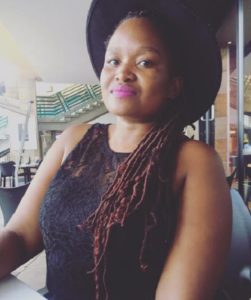 Gaamangwe Joy Mogami is a poet, playwright and screenwriter from Botswana. Her poetry has been published in Kalahari Review, African Writer, Afridiaspora, Poetry Potion, and Brittle Paper. She is the founder and managing editor of an interview magazine, Africa in Dialogue.
Gaamangwe Joy Mogami is a poet, playwright and screenwriter from Botswana. Her poetry has been published in Kalahari Review, African Writer, Afridiaspora, Poetry Potion, and Brittle Paper. She is the founder and managing editor of an interview magazine, Africa in Dialogue.


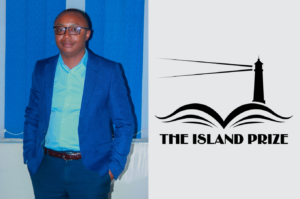


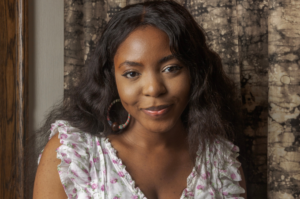
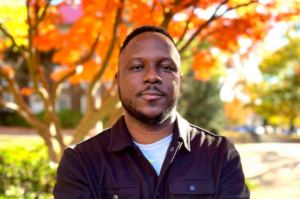


COMMENTS -
Reader Interactions